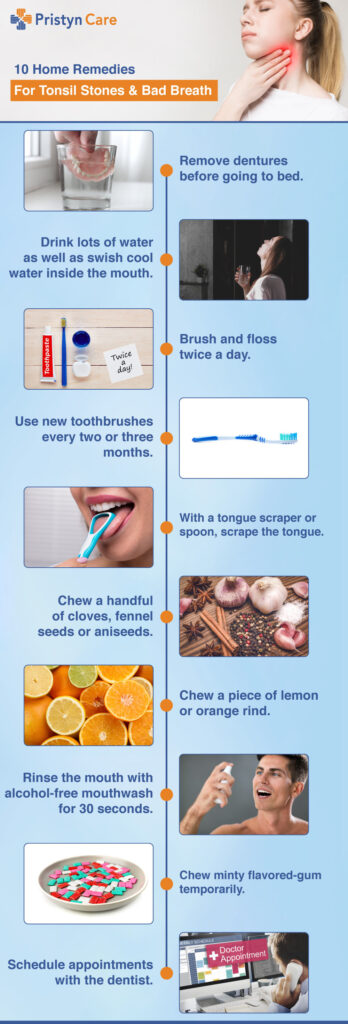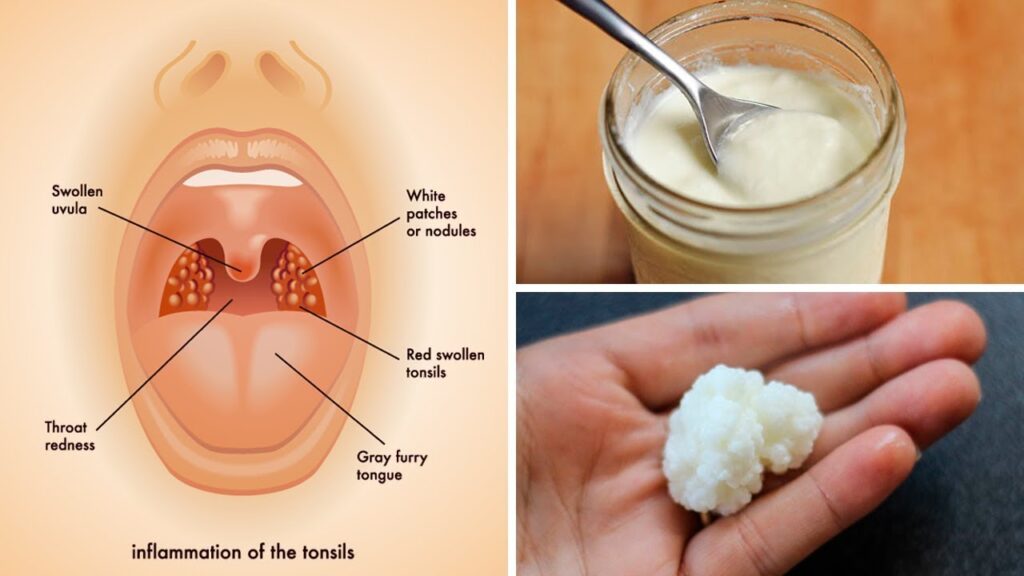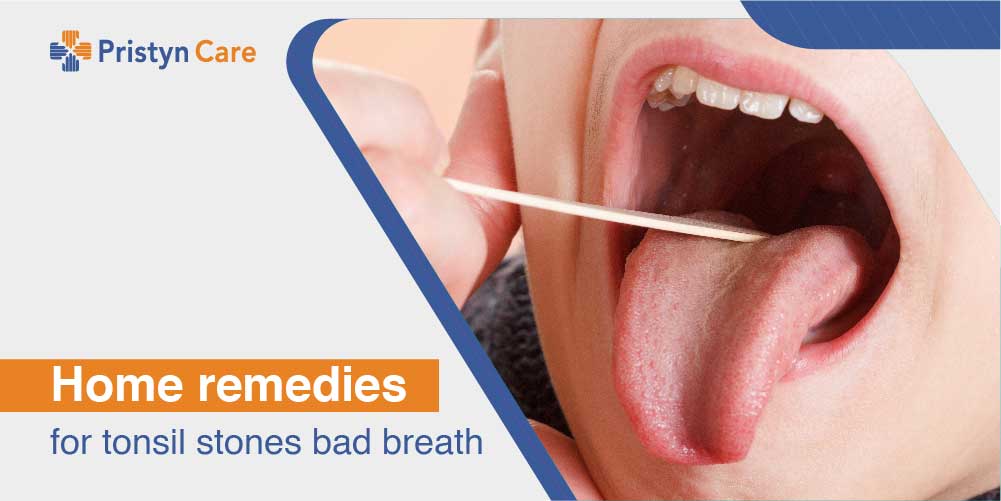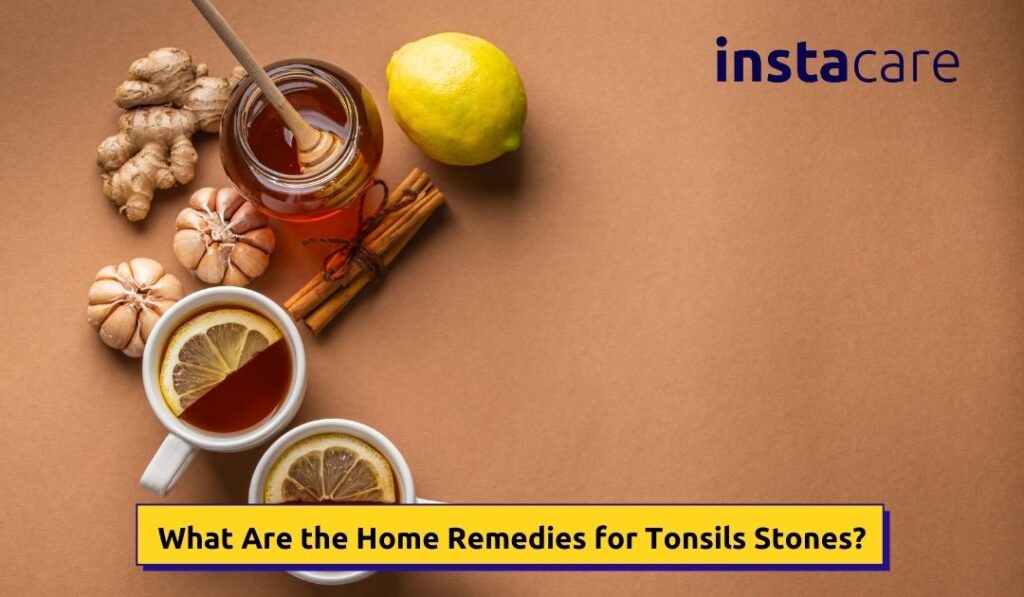Imagine a life without constant sore throats, bad breath, and the discomfort of tonsil stones. Sounds like a dream, doesn’t it? Well, the good news is that there is a natural remedy that can help you say goodbye to those pesky tonsil stones for good. In this article, we will take a closer look at this simple yet effective solution that promises to bring you relief and restore your peace of mind. So, get ready to bid farewell to tonsil stones and say hello to a life filled with improved oral health and overall well-being.

What are tonsil stones?
Tonsil stones, also known as tonsilloliths, are small, whitish or yellowish calcified masses that form in the crevices of the tonsils. They are composed of bacteria, debris, and dead cells that get trapped in the tonsils and harden over time. Tonsil stones can vary in size and may go unnoticed, but larger ones can cause discomfort and produce unpleasant symptoms.
Causes of tonsil stones
Tonsil stones develop when bacteria, food particles, and other debris become trapped in the tonsils. While everyone has tonsils, not everyone experiences tonsil stones. The exact cause of their development is not fully understood, but several factors contribute to their formation:
- Poor oral hygiene: Neglecting to brush and floss regularly can lead to the buildup of bacteria and debris in the tonsils, increasing the risk of tonsil stone formation.
- Chronic tonsillitis: Recurrent or chronic tonsillitis can create an environment conducive to tonsil stone formation. Inflammation and infection in the tonsils provide a breeding ground for bacteria and can lead to the accumulation of debris.
- Large tonsil crypts: Some individuals may have larger crevices in their tonsils, called tonsil crypts. These crypts can trap bacteria, food particles, and other substances, making them more prone to tonsil stone development.

Symptoms of tonsil stones
Tonsil stones may not always cause noticeable symptoms. However, when symptoms do occur, they can range from mild to severe and may include:
- Bad breath (halitosis): The most common symptom of tonsil stones is persistent bad breath. The bacteria and debris trapped in the tonsils can produce a foul odor that is difficult to eliminate with regular brushing or mouthwash.
- Sore throat: Tonsil stones can cause irritation and discomfort in the throat, resulting in a sore throat. This symptom may be more pronounced when swallowing or speaking.
- White debris or spots on the tonsils: Tonsil stones can sometimes be visible as white or yellowish spots on the surface of the tonsils. These spots may be accompanied by swelling or redness.
- Ear pain: In some cases, tonsil stones can cause referred pain to the ears. This can manifest as earache or an uncomfortable sensation in the ears.
How to prevent tonsil stones
While it may not be possible to completely prevent tonsil stones, there are steps you can take to minimize their formation and reduce their occurrence. By practicing good oral hygiene, staying hydrated, and making certain lifestyle changes, you can significantly decrease the likelihood of developing tonsil stones.
Practice good oral hygiene
Maintaining a consistent oral hygiene routine is essential for preventing tonsil stones. Here are some tips to keep your mouth clean:
- Brush your teeth at least twice a day with fluoridated toothpaste, making sure to reach all surfaces of the teeth and the back of the tongue.
- Use dental floss or an interdental cleaner to remove food particles and bacteria from between your teeth.
- Gently brush the surface of your tongue to remove any bacteria or debris that may contribute to tonsil stone formation.
- Rinse your mouth with an antibacterial mouthwash to help kill bacteria and freshen your breath.
Stay hydrated
Drinking an adequate amount of water is crucial for overall oral health. Staying hydrated helps keep your mouth moist and limits the accumulation of debris in the tonsils. Aim to drink at least eight glasses of water per day, and increase your intake if you engage in physical activity or live in a hot climate.
Quit smoking
Smoking not only contributes to various health problems but also increases the risk of tonsil stone formation. The chemicals in tobacco smoke can irritate the tonsils and promote the growth of bacteria. Quitting smoking not only benefits your oral health but also improves your overall well-being.

Home remedies for tonsil stones
If you’re prone to tonsil stones or want to try natural remedies before seeking medical intervention, there are several home remedies that may help alleviate symptoms or reduce the formation of tonsil stones.
Saltwater gargle
A simple yet effective home remedy for tonsil stones is gargling with saltwater. This helps reduce inflammation, kill bacteria, and dislodge any small tonsil stones. To prepare a saltwater gargle:
- Dissolve half a teaspoon of salt in a glass of warm water.
- Gargle the mixture for 20-30 seconds, making sure to reach the back of your throat.
- Spit out the mixture and repeat two to three times a day, especially after meals.
Apple cider vinegar
Apple cider vinegar has antimicrobial properties that can help combat the bacteria responsible for tonsil stones. Additionally, its acidic nature may help dissolve existing tonsil stones. To use apple cider vinegar as a remedy:
- Mix one tablespoon of apple cider vinegar with warm water.
- Gargle the mixture for 30-60 seconds, being careful not to swallow it.
- Spit out the mixture and rinse your mouth with plain water.
- Repeat this process once or twice a day, depending on your preference.
Garlic
Garlic is known for its antibacterial and antifungal properties, making it a potential remedy for tonsil stones. Chewing on a raw garlic clove can help kill bacteria and reduce inflammation. However, be aware that garlic can be potent and may cause a strong breath odor. If you’re concerned about the smell, you can try odorless garlic supplements instead.
Essential oils for tonsil stones
Certain essential oils possess antibacterial, antifungal, and anti-inflammatory properties that can be beneficial in managing tonsil stones. However, it’s important to dilute essential oils properly before use and to consult a healthcare professional if you have any underlying health conditions or sensitivities.
Tea tree oil
Tea tree oil is widely recognized for its antimicrobial properties. It can help kill the bacteria responsible for tonsil stones and reduce inflammation. To use tea tree oil:
- Dilute a few drops of tea tree oil in a carrier oil such as coconut or olive oil.
- Apply the diluted mixture to a cotton swab or cotton ball.
- Gently rub the cotton swab or ball on the tonsils, focusing on areas where the stones are visible or palpable.
- Rinse your mouth with warm water to remove any residue.
Note: Do not swallow tea tree oil, as it can be toxic if ingested.
Lemon oil
Lemon oil contains antibacterial properties that help kill the bacteria responsible for tonsil stones. In addition, its pleasant aroma can help freshen the breath. To use lemon oil:
- Dilute a few drops of lemon oil in a carrier oil or water.
- Gargle with the diluted mixture for 30 seconds.
- Spit out the mixture and rinse your mouth with plain water.
- Repeat once or twice a day, as needed.
Thyme oil
Thyme oil is known for its antimicrobial and antifungal properties. It can help eliminate bacteria, reduce inflammation, and alleviate symptoms associated with tonsil stones. To use thyme oil:
- Dilute a few drops of thyme oil in a carrier oil or water.
- Gargle with the diluted mixture for 30-60 seconds.
- Spit out the mixture and rinse your mouth with plain water.
- Repeat once or twice a day, depending on your preference.

Dietary changes to reduce tonsil stones
The foods you consume can affect the development and recurrence of tonsil stones. Making certain dietary changes can help minimize the risk and improve overall oral health.
Increase water intake
Drinking an adequate amount of water is crucial for preventing tonsil stones. Staying hydrated helps keep your mouth moist and aids in the natural removal of debris and bacteria. Aim to drink at least eight glasses of water per day, and increase your intake if you engage in physical activity or live in a hot climate.
Avoid dairy products
Some individuals find that consuming dairy products, such as milk and cheese, can contribute to the formation of tonsil stones. These products can increase mucus production, leading to the buildup of bacteria and debris in the tonsils. If you notice a correlation between dairy consumption and tonsil stone formation, consider reducing or eliminating dairy products from your diet.
Consume more fruits and vegetables
A diet rich in fruits and vegetables provides essential nutrients and antioxidants that support overall oral health. These foods can help boost your immune system, reduce inflammation, and promote healthy saliva production. Incorporate a variety of fruits and vegetables into your meals to benefit from their natural cleansing and protective properties.
Herbs and supplements for tonsil stones
Certain herbs and supplements may help alleviate symptoms and reduce the recurrence of tonsil stones. It’s important to note that these remedies should not replace medical treatment, and you should consult with a healthcare professional before starting any new supplements.
Echinacea
Echinacea is a popular herb known for its immune-boosting properties. It can help strengthen your body’s defenses against bacteria and reduce the risk of tonsil stone formation. You can find echinacea in various forms, such as capsules, tinctures, or teas. Follow the package instructions for proper dosage and duration.
Vitamin C
Vitamin C is an essential nutrient that supports a healthy immune system. It can help prevent and combat tonsil infections, which in turn reduces the likelihood of tonsil stone formation. You can obtain vitamin C from citrus fruits, berries, leafy greens, or as a dietary supplement. Follow the recommended daily dosage to maintain optimal levels of this vitamin.
Zinc
Zinc is a mineral that plays a crucial role in immune function and wound healing. It can help strengthen your immune system and reduce the risk of tonsil stones. Zinc is available in various forms, including lozenges, capsules, or as part of a multivitamin. Consult a healthcare professional for the appropriate dosage and duration.

Natural mouthwashes for tonsil stones
Using a natural mouthwash can help freshen your breath, kill bacteria, and reduce the occurrence of tonsil stones. Here are a few natural mouthwash options you can try:
Saltwater rinse
A simple saltwater rinse can help create an alkaline environment in your mouth and kill bacteria. To prepare a salt water rinse:
- Dissolve half a teaspoon of salt in a glass of warm water.
- Swish the mixture around your mouth for 30-60 seconds, making sure to reach all areas.
- Spit out the mixture and repeat once or twice a day, as needed.
Peppermint mouthwash
Peppermint oil has antiseptic properties and a refreshing taste that can help combat bad breath. To make a peppermint mouthwash:
- Dilute a few drops of peppermint essential oil in a glass of water.
- Swish the mixture in your mouth for 30-60 seconds.
- Spit out the mixture and rinse your mouth with plain water.
- Repeat daily or as desired.
Aloe vera mouthwash
Aloe vera has natural antibacterial and anti-inflammatory properties that can help reduce the occurrence of tonsil stones. To make an aloe vera mouthwash:
- Mix two tablespoons of aloe vera gel with a cup of water.
- Swish the mixture in your mouth for 30-60 seconds.
- Spit out the mixture and rinse your mouth with plain water.
- You can store the remaining mixture in a sealed container in the refrigerator for future use.
Tongue scraping for tonsil stones
Tongue scraping is a simple practice that can help remove bacteria, debris, and dead cells from the surface of your tongue. This can contribute to overall oral hygiene and reduce the potential for tonsil stone formation.
Benefits of tongue scraping
Tongue scraping offers several benefits in relation to tonsil stones:
- Removes bacteria: Scraping the tongue helps eliminate bacteria that can contribute to tonsil stone formation and bad breath.
- Improves oral hygiene: By removing bacteria and debris from the tongue’s surface, you can improve your overall oral hygiene and reduce the risk of oral health issues.
- Promotes fresh breath: Tongue scraping can help eliminate the bacteria responsible for foul breath, improving your breath’s freshness.
How to use a tongue scraper
Here’s a step-by-step guide on how to use a tongue scraper effectively:
- Stand in front of a mirror and stick your tongue out.
- Place the tongue scraper at the back of your tongue, gently pressing down.
- Slowly and gently scrape the surface of your tongue from the back to the front, removing any visible debris.
- Rinse the tongue scraper under running water to remove any residue.
- Repeat this process two or three times, making sure to cover the entire surface of the tongue.
- Rinse your mouth thoroughly with water or mouthwash to remove any remaining debris.
Nasal irrigation for tonsil stones
Tonsil stones can sometimes be associated with postnasal drip or nasal congestion. Nasal irrigation can help flush out any excess mucus or bacteria from the nasal passages, potentially reducing the risk of tonsil stone formation.
Neti pot
A neti pot is a small, teapot-like device used for nasal irrigation. To perform nasal irrigation with a neti pot:
- Fill the neti pot with saline solution or a mixture of salt and warm water.
- Tilt your head sideways over a sink.
- Insert the spout of the neti pot into one nostril, creating a seal.
- Tilt the neti pot up, allowing the saline solution to flow into your nasal passage.
- Breathe through your mouth as the solution passes through your nasal cavity and out the other nostril.
- Repeat the process with the other nostril.
- Rinse the neti pot thoroughly with warm water after each use.
Saline nasal spray
Saline nasal sprays are readily available over the counter and provide a convenient and gentle way to irrigate the nasal passages. To use a saline nasal spray:
- Tilt your head slightly forward over a sink.
- Insert the nozzle of the spray bottle into one nostril.
- Aim the nozzle towards the back of your head, away from the septum, and gently spray the saline solution into your nostril.
- Allow the solution to flow out naturally or blow your nose gently to remove excess solution and mucus.
- Repeat the process with the other nostril.
Steam inhalation
Steam inhalation can help loosen mucus and reduce nasal congestion, potentially minimizing the risk of postnasal drip and tonsil stone formation. To perform steam inhalation:
- Boil a pot of water and remove it from the heat source.
- Place a towel over your head, creating a tent, and position your face over the pot of hot water.
- Inhale the steam through your nose, taking slow and deep breaths.
- Continue for 5-10 minutes, or until the steam dissipates.
Note: Be cautious and avoid steam burns by keeping a safe distance from the boiling water and ensuring proper ventilation.
When to see a doctor
While most cases of tonsil stones can be managed with home remedies and lifestyle changes, there are instances where medical intervention may be necessary. If you experience any of the following, consult a healthcare professional:
Persistent or severe symptoms
If you have ongoing symptoms such as persistent bad breath, sore throat, or visible tonsil stones, despite trying home remedies, it’s advisable to seek medical guidance. A healthcare professional can evaluate your symptoms and provide appropriate treatment options or referrals if necessary.
Difficulty swallowing
If tonsil stones or their associated symptoms cause difficulty or pain with swallowing, it’s essential to consult a healthcare professional. Difficulty swallowing can indicate an underlying issue that requires proper evaluation and treatment.
Frequent tonsil stone recurrence
If you frequently experience the formation of tonsil stones or if they significantly impact your quality of life, it’s recommended to see a healthcare professional. They can assess your situation, identify any underlying causes, and suggest treatment options to help manage or prevent tonsil stones in the future.
In conclusion, tonsil stones can range from a minor annoyance to a significant discomfort. By practicing good oral hygiene, making lifestyle changes, and trying natural remedies, you can minimize tonsil stone formation and alleviate associated symptoms. Remember, if you have persistent symptoms or concerns, it’s always best to consult with a healthcare professional for proper evaluation and guidance.
Related Terms About Natural Remedy For Tonsil Stones.
6 Home Remedies For Tonsil Stones, Effective Home Remedies For Tonsil Stones, Home Remedies For Sore Tonsil Stones, Home Remedies For Tonsil Stones In Child, Natural Remedies For Tonsil Stones, Natural Remedy For Tonsil Stones Removal, Natural Treatment For Tonsil Stones, Old Home Remedies For Tonsil Stones